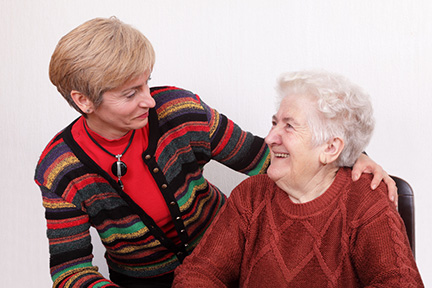
Why are statistics mostly used to illustrate unpleasant things waiting for us in the future, as if there were nothing wonderful to look forward to? In fact, I don’t think any bad-news statistic should be cited without a corresponding good-news statistic.
Here are a couple more bad ones, but we’ll try to balance these out:
- One in three people in the U.S. is a caregiver for someone who is sick, disabled, or aged. But wait, it gets worse.
- Thirty percent of these caregivers die before the person for whom they are providing care.
Caregiving is one of the most stressful jobs there is, and I have nothing but admiration and gratitude for those who do it professionally. Whatever they are paid, they are not paid enough. But at the end of their shift, their caregiving is over for the day or night.
If you’re a family caregiver, it is a round-the-clock, unpaid job, and the stress is relentless. I have sat in support groups with women who have spent the entire session weeping uncontrollably. They had, for the most part, learned to accept that their husbands were no longer capable of fending for themselves. They just couldn’t deal with it. And they couldn’t find any respite.
So, how do you mitigate the stress so you can lead a healthier, happier caregiving life, and not die before your time? Here are a few thoughts on taking better care of yourself, with the proviso that everyone’s situation is different, it will not be possible to implement all of these, and it is easier to give advice than it is to put into practice:
- Get regular help, whether it’s a family member, a friend, a paid professional or a combination of the three. If you feel guilty about not always being there to care, get over it. Create a schedule that gives you time, every day if possible, to get your errands done, exercise, meditate or have your spiritual needs met.
- Realize you are not alone. Although no one is going through exactly what you’re going through, people do succeed with this seemingly insurmountable task of caregiving. Seek out those who have been through this before for encouragement and coping mechanisms.
- Rest and exercise. Rest alone is not enough. It’s true that lack of sleep shrinks your brain, but it’s just as true that being physically active plays an essential role in maintaining your physical and mental health. Go for a walk and clear your head.
- Eat right. You should know by now what’s good for you and what’s bad for you. Don’t feed the sickness. Take your supplements and stay healthy.
- Eliminate other stressors from your life. You’ve got enough going on already. Simplify meals, housework, bill payments, automate anything that can be automated. Although caregiving has an emotional aspect unlike any other daily task, it is a daily task, and the more you can routinize it, the less painful it will become.
And finally, here are some statistics for some things you can actually enjoy:
- Hot cocoa and chocolate can improve your memory. Participants in a study who received high-dose of cocoa flavonols had memory skills of people 20-30 years younger.
- Thinking positively keeps your heart healthier. Individuals with the highest levels of optimism are 76 percent more likely to have ideal health scores than their pessimistic counterparts.
